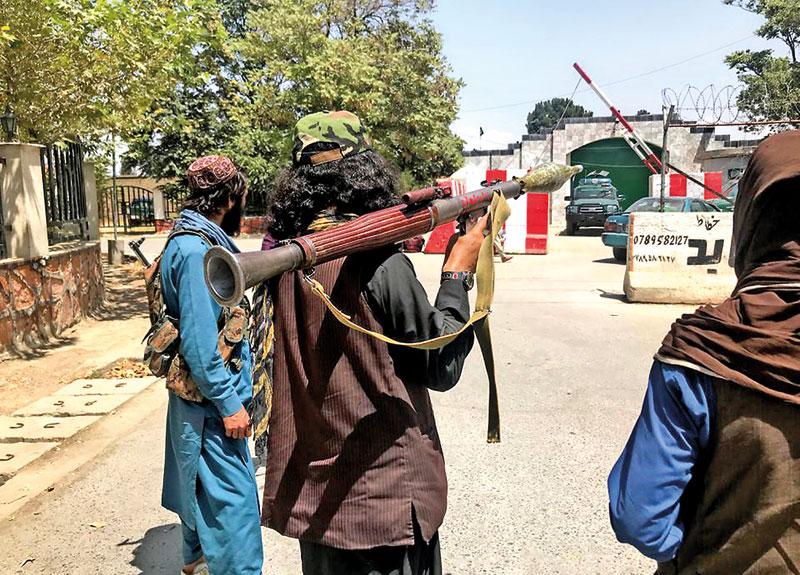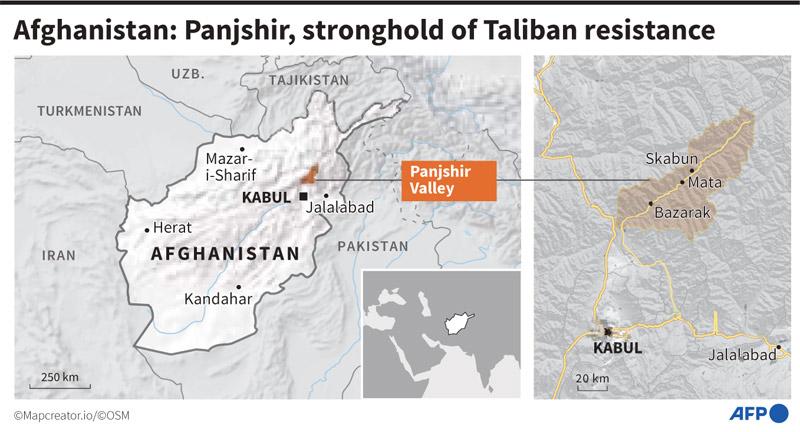20 Aug 2021 - {{hitsCtrl.values.hits}}

Taliban forces stand guard outside a Kabul government office. (Reuters)
 The headlines said it all. On Sunday and Monday, Western media headlines screamed that Afghanistan had fallen. The western media believed the hawks’ narrative of America’s war on terror. It was a terror war, the rulers said; the media parroted it and refused to see that it was an imperialist war.
The headlines said it all. On Sunday and Monday, Western media headlines screamed that Afghanistan had fallen. The western media believed the hawks’ narrative of America’s war on terror. It was a terror war, the rulers said; the media parroted it and refused to see that it was an imperialist war.
The so-called war on terror after the 9/11 attacks fitted well in the neoconservatives’ plan to militarily dominate the world through military bases in strategic locations.
With the US-led NATO (North Atlantic Treaty Organisation) forces occupying Afghanistan in October 2001, the Americans eyed the Caucasus and Central Asia, undermining the security concerns of Russia and China. US bases were set up in Uzbekistan and Kyrgyzstan.
Given this geopolitical backdrop, what happened on Sunday was the liberation of that country, regardless of the horrors and nightmares the Taliban may bring in their baggage.
How the Taliban achieved this victory, which was, in many ways, a sequel to the Vietnam War’s Saigon moment, is well explained by Chinese leader Mao Zedong’s parable. While fighting the Japanese occupation force, Chairman Mao in his 1937 masterpiece ‘On Guerilla Warfare’, laid out a clear strategy for a successful insurgency. He underlined the importance of the population, which he described as the ‘SEA’. In this proverbial ‘sea’, the guerilla, like a fish, must swim to survive.
The Taliban had been swimming in the sea, since they were ousted from power in October 2001 when the then US President George W. Bush, persuaded by the neoconservative cabal, deferred his plan to invade Iraq and, instead, decided to attack and occupy Afghanistan.
This was the war the Americans wholeheartedly supported. Get rid of al-Qaeda which dared to attack America and its Taliban protectors, they told Bush. When the war began, in the first few days of bombing and missile attacks alone, more than 3000 Afghan civilians died. Throughout the 20 year occupation, hundreds of thousands of Afghans were killed. Such indiscriminate killings which the US justified as collateral damage helped the Taliban to swell their ranks and provided them the sea to be Mao’s fish to continue their fight against the occupation force. Their perseverance paid off. Within a few years of the US occupation, The Taliban were back in the countryside. The puppet regime controlled the urban centres with the support of the US forces. Thus, there was little surprise when the occupiers were caught off guard by the rapid collapse of the government of President Ashraf Ghani this week. He fled the country in a helicopter allegedly full of dollars. The Afghan armed forces which the US trained and sustained with a US$ 83 billion budget surrendered without much resistance. Ghani probably feared that the fate that befell the Soviet-occupation-era President, Mohammed Najibullah, during the 1996 Taliban victory, would befall him. Najibullah was tortured and killed by the Taliban.
While Ghani and his ministers found safe havens in the United Arab Emirates and other countries, the Western media highlighted the heart-rending drama at the Kabul airport with thousands of Afghan men, women and children, desperate to escape Taliban punishment for siding with the occupation force, blocked the runway, some clinging to the undercarriage of a US air force aircraft, pleading with the US and the West to take them to safety. The US now blames the Ghani government for letting down the Afghan people.
There was also an exodus in the reverse on the Afghanistan-Pakistan border, where thousands of Afghans were seen returning to the country from exile in Pakistan. They were happy that their country had been freed. The positive signals emanating from the Taliban do not mean the Taliban 2.0 are a reformed lot. Many fear the new regime will give Shariah law a tough interpretation to deny the Afghan people their fundamental rights. Upon their return, the Taliban claimed they would form an inclusive government and uphold the women’s right to education and employment within the context of the Islamic law. But not many people are ready to believe them.
This week, the Taliban tried to portray that they were much more enlightened. They tried to present themselves as kindhearted Muslims, in a turn of events full of symbolisms associated with the Prophet Muhammad’s Makkah conquest 14 centuries ago. Upon the bloodless victory of Makkah, the prophet Muhammad, recalling how Jacob’s son Joseph forgave his brothers who tried to kill him, told the Makkah pagans who persecuted him and his followers that they were all forgiven. In yet another symbolism, a Taliban commander recited Quran’s 110th chapter which was revealed after the Makkah conquest of the Prophet.
Symbolisms apart, whether the Taliban will walk the talk is a big uncertainty. There is doubt that the Taliban are enlightened enough to understand that the Prophet’s Islam was one of liberation that broke social shackles and started a process of women empowerment. Like most extremists, the Taliban subscribe to an Islam that was shaped by male chauvinistic medivial imams who lived in an era that was mired in political skullduggery, factionalism and foreign invasions. By opposing rationalistic interpretation of the scripture, these imams caused the collapse of Islam’s intellectual march.
But there were some signs that the Taliban may not be like what they were before -- a pariah on the international stage. This time they want to be recognised as a civilised nation capable of conducting relations with the rest of the world. Besides, it has given a word to the US that it would not harbour foreign terrorist groups in Afghanistan.
The Taliban victory has caused a tectonic shift in geopolitics. After dumping some two trillion dollars in the imperial war that only enabled the arms industry to make billions of dollars in profit, the US is out of Afghanistan. Playing the lead roles from now on will be China which seeks to expand its Belt-and-Road via Afghanistan to Turkmenistan and beyond. Then, there is Russia which is happy to see its southern backyard has been cleansed of American presence. Then, there is Pakistan which midwifed the birth of the Taliban in the early 1990s and maintained backchannel links with the group even after Washington forced Islamabad at gunpoint to join its imperial war. Then, there is Iran, which expects the Taliban to be part of an alliance it seeks to promote together with China, Russia and likeminded nations. Besides, Turkey and Qatar have also maintained close links with the Taliban.
One of the biggest losers is India which has invested billions of dollars in infrastructure projects in Afghanistan. Pakistan had never been happy about India’s large presence with too many consulates in Afghanistan. Besides, the puppet regime had often sided with India, much to the chagrin of Pakistan.
As a new geopolitical equation emerges from Afghanistan, it is too early to say what awaits it under the Taliban. Do not underestimate the US. It still possesses the capabilities to strike Afghanistan. Besides, very little is known about the Taliban leadership squabbles

28 Nov 2024 6 hours ago
28 Nov 2024 7 hours ago
28 Nov 2024 8 hours ago
28 Nov 2024 28 Nov 2024
28 Nov 2024 28 Nov 2024